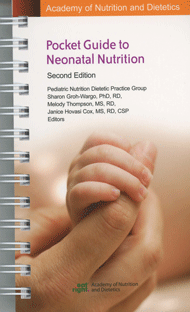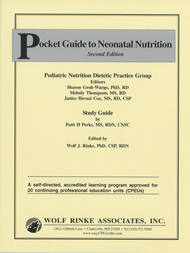| Pocket Guide to Neonatal Nutrition, 3rd Edition
| C298 |
20 CPEUs |
HARD COPY |
$169.95 |
|
An indispensable CPE activity for RDNs working with premature infants. Great resource to help you pass your Board Certification as a Specialist in Pediatric Nutrition (CSP).The easy-to-use format presents practical information on topics including:
- nutrition assessment,
- parenteral and enteral nutrition,
- medical/surgical conditions,
- discharge and follow-up, and
- conversion tables.
Includes key updates to medical surgical conditions and growth charts, addresses parenteral nutrition shortages and new enteral products, and discusses safety issues with the use of thickeners.
Share with a friend and Save! Click here for important information about
sharing.
To order an ADDITIONAL Reporting Form click below:
| C298F |
20 CPEUs |
REPORTING FORM |
$60.00 |
|
Pocket Guide to Neonatal Nutrition, 3rd Edition
© 2024 Wolf Rinke Associates. All rights reserved for this
self-directed accredited learning activity. Reproduction in whole or
part without written permission, except for brief excerpts, is prohibited.
LEARNING OBJECTIVES
Upon completion of this CPE activity you will be better able to:
-
Apply components of nutrition assessment of infants with various clinical conditions;
-
Evaluate growth using appropriate growth curves to characterize growth for various infant populations;
-
Determine adequate and appropriate growth goals for infants;
-
Apply principles of nutrition assessment and growth to formulate patient-focused nutrition interventions;
-
Discuss limitations and use of biochemical assessment in infants pertinent to nutrition assessment and monitoring;
-
Calculate enteral intakes from prescribed feeding regimens;
-
Prescribe appropriate and recommended parenteral nutrition goals for preterm infants;
-
Evaluate clinical conditions impacting parenteral nutritional needs and delivery;
-
Recognize biochemical indicators that may warrant adjustment of the parenteral nutrition prescription;
-
Identify risk factors for necrotizing enterocolitis (NEC) and appropriate nutrition interventions to help prevent NEC, and used post-NEC;
-
Discuss strategies for management of parenteral nutrition-associated cholestasis;
-
Recommend an appropriate method for cycling parenteral nutrition in infants;
-
Discuss use of human milk in enteral nutrition;
-
Evaluate variables affecting risk of metabolic bone disease in infants;
-
Recommend options for fortification of human milk appropriate to the infant’s gestational age;
-
Suggest acceptable infant feeding substitutes for human milk based on the infant’s clinical condition;
-
Increase caloric concentrations of infant formula recipes;
-
Evaluate potential nutrients of concern for infants with short bowel syndrome;
-
Apply knowledge of nutrition assessment and nutrition support to infants with congenital heart disease, chronic lung disease, and gastroesophageal reflux; and
-
Discuss essential components of discharge nutrition plans and follow-up for infants.
If you prefer to order by phone, mail
or fax click below
or click here to contact us with
other questions.
For information about our other products and
services return to the sidebar at the top of the page.
|



